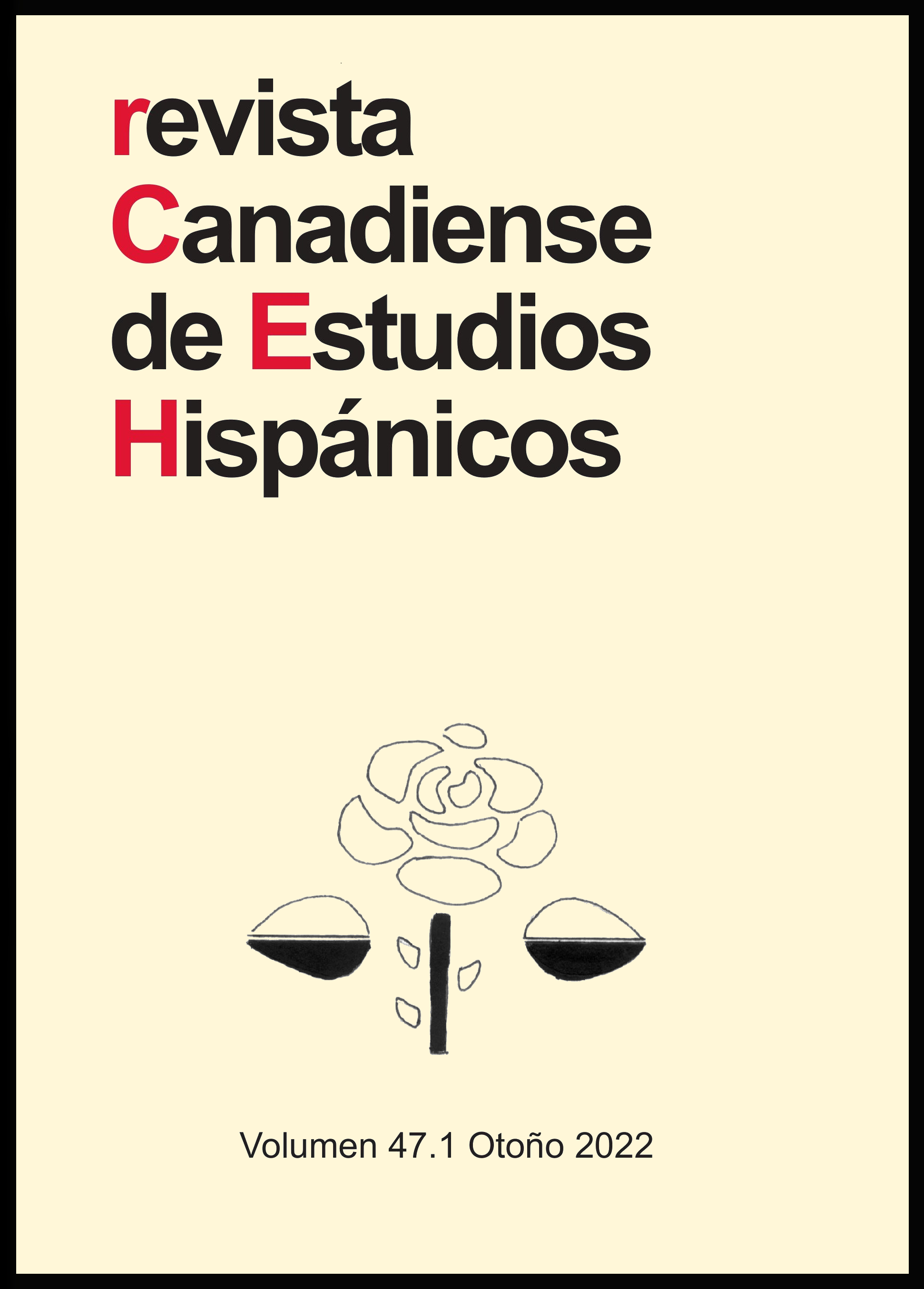Southern Cone Memory Discourse and Cuba’s Generación de los Hijos in Camila Guzmán Urzúa’s El telón de azúcar (2006)
DOI:
https://doi.org/10.18192/rceh.v47i1.4748Keywords:
Cuba, Special Period, Memory, La generación de los hijos, Cuban identityAbstract
The present article analyzes the documentary Telón de azúcar (2006) by Cuban filmmaker Camila Guzmán Urzúa (1971) and the cinematic dialogue she sustains with the work of her father, Chilean documentarian Patricio Guzmán. Although the documentary primarily deals with Cuba and the impact of the Special Period on the filmmaker’s generation, the article proposes that Guzmán Urzúa, upon borrowing audiovisual discourses and techniques from her father’s post-dictatorship cinematography, develops a searing critique of the revolutionary dream of her parents’ generation, even as she maintains her faith in socialist futures.
References
BALAISIS, NICHOLAS. Cuban Film Media, Late Socialism, and the Public Sphere. New York: Palgrave Macmillan, 2016.
BARTHES, ROLAND. Camera Lucida. New York: Hill and Wang, 2010.
BELLO, MARÍA JOSÉ AND ANA SAINT-DIZIER. “Documentales sobre la memoria chilena: aproximaciones desde lo íntimo.” Cinémas d’Amérique Latine 19 (2011): 77-83.
BOYM, SVETLANA. “Nostalgia and its discontents.” The Hedgehog Review 9.2 (2007). N. pag. (2007).
CARRI, ALBERTINA, DIR. Los rubios. Primer Plano Film, 2003.
CASTAÑEDA, CLAUDIA. Figurations: Child, Bodies, Worlds. Durham: Duke UP, 2002.
CASTRO AVELLEYRA, ANABELLA. “La primera persona, el amor y la persistencia de las preguntas en El telón de azúcar, de Camila Guzmán Urzúa.” Docs On-line 18 (2015): 272-99.
DOPICO, ANA MARÍA. “Picturing Havana: History, Vision, and the Scramble for Cuba.” Nepantla: Views from South 3.3 (2002): 451-93.
FAULKNER, JOANNE. “Vulnerability of ‘Virtual’ Subjects: Childhood, Memory, and Crisis in the Cultural Value of Innocence.” SubStance 42.3 (2013): 127-47.
GARCÍA BORREO, JOSÉ ANTONIO. “El telón de azúcar (2007), de Camila Guzmán Urzúa.” Cine Cubano, La Pupila Insomne. 12 Oct. 2011. Web.
GÓMEZ-BARRIS, MACARENA. Where Memory Dwells: Culture and State Violence in Chile. Berkeley: U of California P, 2009.
GUZMÁN, PATRICIO, DIR. Chile, la memoria obstinada. Icarus Films, 1997.
GUZMÁN, PATRICIO, DIR. Nostalgia de la luz. Atacama Productions, 2010.
GUZMÁN, PATRICIO, DIR. Salvador Allende. Icarus Films, 2004.
GUZMAN URZÚA, CAMILA. Interview by Pamela Biénzombas. Mabuse Revista de Cine, 2007. Web.
GUZMAN URZÚA, CAMILA. Interview by Christian Del Moral. Cine Latino en Nueva York, 30 Jul. 2007. Web.
GUZMAN URZÚA, CAMILA. Interview by Facundo García. Página 12, 10 Apr. 2009. Web.
GUZMÁN URZÚA, CAMILA, DIR. El telón de azúcar. Cineteca Nacional, 2006.
HERNÁNDEZ-REGUANT, ARIANA. “Multicubanidad.” Cuba in the Special Period: Culture and Ideology in the 1990s. Ed. Ariana Hernández-Reguant. New York: Palgrave Macmillan, 2009. 69-88.
HERNÁNDEZ-REGUANT, ARIANA. “Writing the Special Period: An Introduction.” Cuba in the Special Period: Culture and Ideology in the 1990s. Ed. Ariana Hernández-Reguant. New York: Palgrave Macmillan, 2009. 1-18.
LAZZARA, MICHAEL J. “Remembering Revolution after Ruin and Genocide: Recent Chilean Documentary Films and the Writing of History.” Film and Genocide. Eds. Wilson, Kristi M. and Tomás F. Crowder-Taraborreli. Madison: U of Wisconsin P, 2012. 67-86.
LLANOS, BERNARDITA. “Memoria historia y personal en los documentales Chile, La memoria obstinada de Patricio Guzmán y El telón de azúcar de Camila Guzmán.” Fronteras de la memoria: cartografías de género en artes visuales, cine y literatura en las Américas y España. Ed. Ana María Goetschel and Bernardita Llanos. Santiago de Chile, Editorial Cuarto Propio, 2012. 23-40.
MAGUIRE, GEOFFREY. The Politics of Postmemory: Violence and Victimhood in Contemporary Argentine Culture. New York: Palgrave Macmillan, 2017.
RICHARD, NELLY. Margins and Institutions: Art in Chile Since 1973. Melbourne, Australia, Art & Text, 1986.
RIVERO CABRERA, ARELIS. “Ser cubano y haber nacido en los 70: memoria e identidad generacional en El telón de azúcar, un documental de Camila Guzmán.” La BloGoteca de Babel 4 (2013): 1-14.
STOCK, ANN MARIE. On Location in Cuba: Street Filmmaking during Times of Transition. Chapel Hill: U of North Carolina P, 2009.
VENEGAS, CRISTINA. The State, the Individual, and Digital Media in Cuba. New Brunswick NJ: Rutgers UP, 2010.
WHITFIELD, ESTHER. “Truths and Fictions: The Economics of Writing: 1994-1999.” Cuba in the Special Period: Culture and Ideology in the 1990s. Ed. Ariana Hernández-Reguant. New York: Palgrave Macmillan, 2009. 21-36.
Downloads
Published
Issue
Section
License
Copyright (c) 2025 Tess Renker

This work is licensed under a Creative Commons Attribution 4.0 International License.
Aquellos/as autores/as que deseen publicar en la RCEH o tengan publicaciones en esta revista aceptan los siguientes términos:
- La RCEH solo publica artículos inéditos.
- Los artículos enviados a la RCEH no deben estar bajo consideración en ninguna otra revista o editorial.
- Los/as autores/as podrán incluir imágenes cuando las consideren esenciales para su estudio. Es responsabilidad suya el obtener por escrito la autorización para su reproducción y presentarla a la RCEH.
- Los/as autores/as conservarán sus derechos de autor y garantizarán a la RCEH el derecho de primera publicación de su obra, el cuál estará simultáneamente sujeto a la Licencia de reconocimiento de Creative Commons que permite a terceros compartir la obra siempre que se indique su autor y su primera publicación en la RCEH.
- 12 meses después de la publicación de su obra en la RCEH, los/as autores/as podrán adoptar otros acuerdos de licencia no exclusiva de distribución de la versión de la obra publicada (p. ej.: depositarla en un archivo telemático institucional o publicarla en un volumen monográfico) siempre que se indique la publicación inicial en esta revista.


